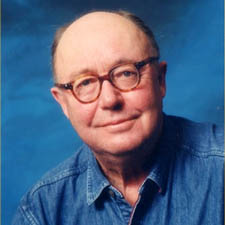Roger Needham facts for kids
Quick facts for kids
Roger Needham
|
|
|---|---|

Roger Needham in 1999
|
|
| Born | 9 February 1935 Sheffield, England, UK
|
| Died | 1 March 2003 (aged 68) Willingham, Cambridgeshire, England, UK
|
| Nationality | British |
| Education | Doncaster Grammar School for Boys |
| Alma mater | University of Cambridge (BA, PhD) |
| Known for | Needham–Schroeder protocol BAN logic Tiny Encryption Algorithm XTEA |
| Spouse(s) | |
| Awards | Faraday Medal (1998) |
| Scientific career | |
| Fields | Computer science |
| Institutions | University of Cambridge Microsoft |
| Thesis | The application of digital computers to problems of classification and grouping (1962) |
| Doctoral advisor | David Wheeler |
| Doctoral students |
|
Roger Michael Needham (born February 9, 1935 – died March 1, 2003) was a very important British computer scientist. He helped make computers safer and better for everyone.
Contents
Early Life and School
Roger Needham was born in Birmingham, England. He was the only child of Phyllis Mary and Leonard William Needham. His father was a chemistry teacher at a university.
Roger went to Doncaster Grammar School for Boys in Doncaster. After that, in 1953, he went to St John's College, Cambridge. He studied mathematics and philosophy and earned his first degree in 1956.
Later, he earned his PhD, which is a very high university degree. His special project was about how computers could help sort and find documents automatically. He worked on many key computer projects. These included making computers more secure, improving how they run (operating systems), and designing how they connect in small areas (local area networks).
Amazing Computer Inventions
Roger Needham made many important discoveries in computer science. He helped create the BAN logic. This is a special way to check if people or computers are truly who they say they are. It's like a digital ID check!
He also worked with Michael Schroeder to create the Needham–Schroeder protocol. This is a set of rules that helps computers securely prove their identity and share secret keys. It's the basic idea behind a system called Kerberos, which many computer networks use to keep things safe.
Roger also helped design two special ways to scramble information, called TEA and XTEA. These are like secret codes that keep your data private. He also found a clever way to protect passwords. He used a "one-way hash function" which turns your password into a unique code that's hard to crack.
Working at Cambridge and Microsoft
In 1962, Roger joined the Computer Laboratory at the University of Cambridge. It was called the Mathematical Laboratory back then. He became the head of the laboratory in 1980. He was made a professor in 1981 and stayed there until he retired in 1995.
After retiring from Cambridge, Roger didn't stop working! In 1997, he helped start Microsoft's research lab in the UK. This lab, called Microsoft Research, works on new computer ideas.
He was also one of the first members of Wolfson College, Cambridge, which is a part of the University of Cambridge.
Roger was a respected member of several important computer groups. These included the International Association for Cryptologic Research and the IEEE Computer Society. He became a Fellow of the Association for Computing Machinery in 1994.
Awards and Special Honors
Roger Needham received many awards for his work:
- In 1985, he became a Fellow of the Royal Society (FRS). This is a very high honor for scientists in the UK.
- In 1993, he became a Fellow of the Royal Academy of Engineering (FREng).
- In 2001, he was given the title Commander of the Order of the British Empire (CBE) by the Queen. This was for his great contributions to computing.
- He also received special honorary degrees from several universities, including the University of Twente and Loughborough University.
Awards Named After Roger Needham
To honor his memory, several awards are named after Roger Needham.
The British Computer Society started the annual Roger Needham Award in 2004.
The European Conference on Computer Systems (EuroSys) also created the annual Roger Needham PhD award. This award gives €2,000 to a PhD student from a European university. The student's PhD project must be an amazing and new idea in computer systems.
Here are some past winners:
- 2021: Victor van de Veen
- 2020: Michael Schwarz
- 2019: Manolis Karpathiotakis
- 2018: Dennis Andriesse
- 2015: Cristiano Giuffrida
- 2014: Torvald Riegel
- 2013: Asia Slowinska
- 2012: Derek Murray
- 2011: Jorrit Herder
- 2010: Willem de Bruijn
- 2009: Jacob Gorm Hansen
- 2008: Adam Dunkels
- 2007: Nick Cook
- 2006: Oliver Heckmann
Personal Life
Roger Needham married Karen Spärck Jones in 1958. She was also a computer scientist. Roger passed away from cancer in March 2003 at his home in Willingham, Cambridgeshire.
 | Georgia Louise Harris Brown |
 | Julian Abele |
 | Norma Merrick Sklarek |
 | William Sidney Pittman |

